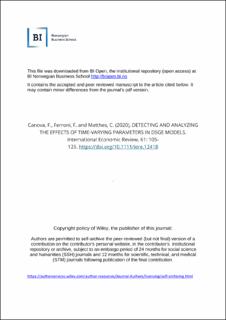| dc.contributor.author | Canova, Fabio | |
| dc.contributor.author | Ferroni, Filippo | |
| dc.contributor.author | Matthes, Christian | |
| dc.date.accessioned | 2021-06-29T08:47:33Z | |
| dc.date.available | 2021-06-29T08:47:33Z | |
| dc.date.created | 2020-04-16T12:00:15Z | |
| dc.date.issued | 2020 | |
| dc.identifier.citation | International Economic Review. 2020, 61 (1), 105-125. | en_US |
| dc.identifier.issn | 0020-6598 | |
| dc.identifier.uri | https://hdl.handle.net/11250/2761836 | |
| dc.description.abstract | We study how structural parameter variations affect the decision rules and economic inference. We provide diagnostics to detect parameter variations and to ascertain whether they are exogenous or endogenous. A constant parameter model poorly approximates a time‐varying data generating process (DGP), except in a handful of relevant cases. Linear approximations do not produce time‐varying decision rules; higher‐order approximations can do this only if parameter disturbances are treated as decision rule coefficients. Structural responses are time invariant regardless of order of approximation. Adding endogenous variations to the parameter controlling leverage in Gertler and Karadi's model substantially improves the fit of the model. | en_US |
| dc.language.iso | eng | en_US |
| dc.publisher | Wiley | en_US |
| dc.title | DETECTING AND ANALYZING THE EFFECTS OF TIME‐VARYING PARAMETERS IN DSGE MODELS | en_US |
| dc.type | Journal article | en_US |
| dc.type | Peer reviewed | en_US |
| dc.description.version | acceptedVersion | en_US |
| dc.source.pagenumber | 105-125 | en_US |
| dc.source.volume | 61 | en_US |
| dc.source.journal | International Economic Review | en_US |
| dc.source.issue | 1 | en_US |
| dc.identifier.doi | 10.1111/iere.12418 | |
| dc.identifier.cristin | 1806583 | |
| cristin.ispublished | true | |
| cristin.fulltext | postprint | |
| cristin.qualitycode | 2 | |
